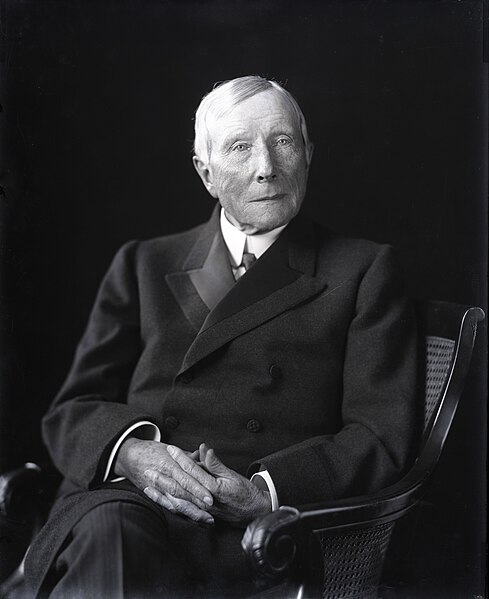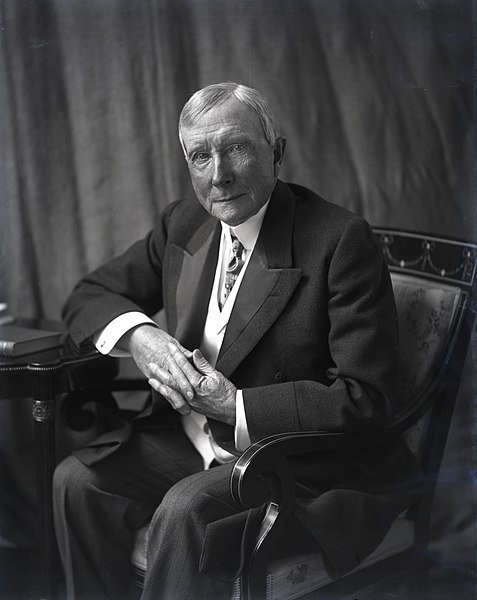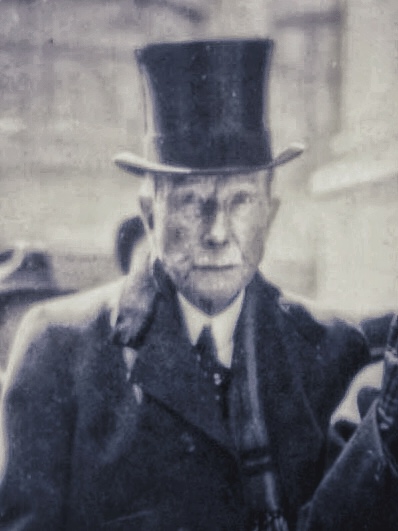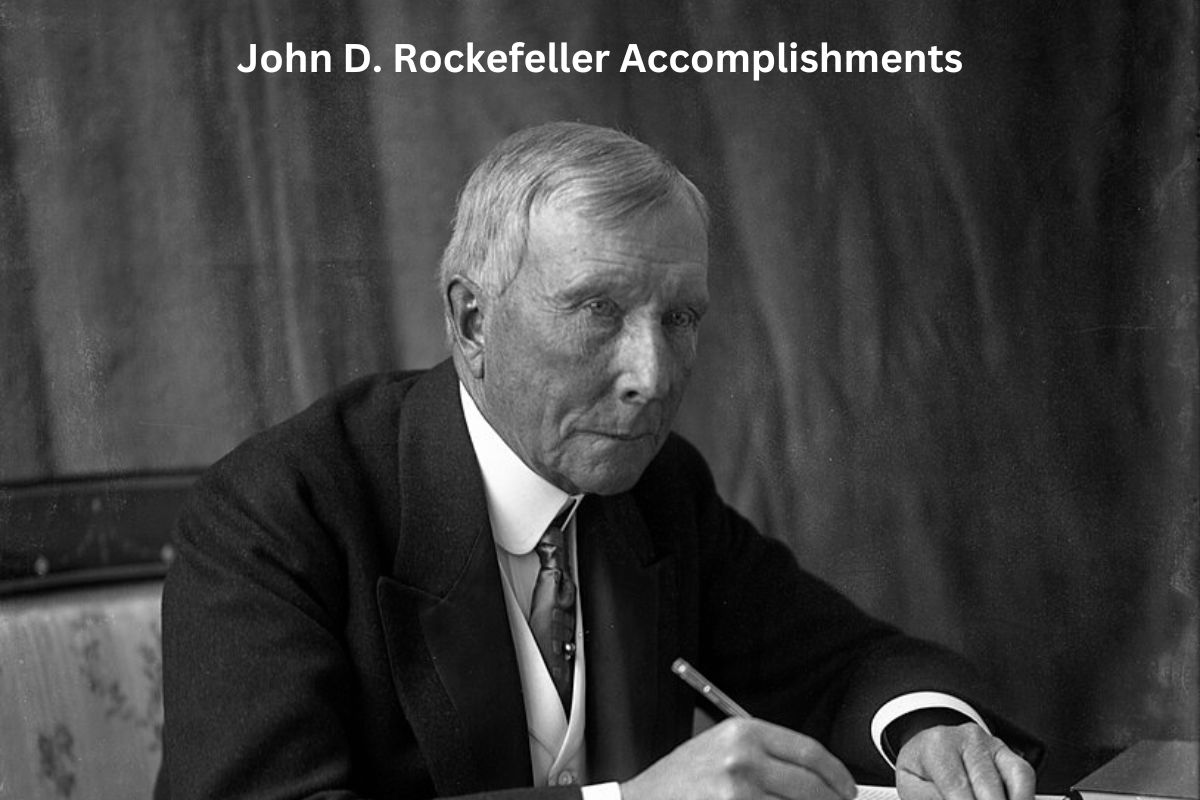John D. Rockefeller was a prominent American industrialist and philanthropist of the late 19th and early 20th centuries. He co-founded the Standard Oil Company, revolutionizing the oil industry and accumulating immense wealth.
Beyond his business success, he is known for his significant contributions to philanthropy, including the establishment of the Rockefeller Foundation.
Rockefeller’s legacy is marked by his impact on both the business world and society through his innovative practices, conservation efforts, and enduring commitment to charitable causes.
Accomplishments of John D. Rockefeller
1. Co-founded Standard Oil Company
John D. Rockefeller, along with his business partners, including his brother William Rockefeller and several others, co-founded the Standard Oil Company in 1870.
The company initially operated in Cleveland, Ohio, and it quickly became a dominant force in the burgeoning American petroleum industry.
Also Read: Facts About John D. Rockefeller
Under Rockefeller’s leadership, Standard Oil would go on to revolutionize the way oil was extracted, refined, and distributed.

2. Implemented vertical integration in the oil industry
One of Rockefeller’s most significant contributions to the oil industry was the implementation of vertical integration.
This strategy involved controlling all aspects of the oil production and distribution process, from drilling for crude oil to refining it into various products and then transporting and marketing those products.
Also Read: Timeline of John D. Rockefeller
By doing so, Standard Oil could streamline operations, reduce costs, and maintain a stranglehold on the market. This strategy helped Standard Oil become incredibly efficient and profitable, but it also drew the attention of regulators due to concerns about monopolistic practices.
3. Established the Rockefeller Foundation for philanthropy
In 1913, John D. Rockefeller established the Rockefeller Foundation, marking a turning point in his life and legacy. The foundation was one of the earliest and most prominent philanthropic organizations of its kind.
Rockefeller dedicated a significant portion of his wealth to the foundation, which aimed to improve the well-being of humanity through various initiatives. Over the years, the Rockefeller Foundation has supported projects in public health, education, scientific research, social sciences, and the arts.
It played a pivotal role in advancing medical research and contributed to the development of treatments for diseases like malaria and hookworm.
This commitment to philanthropy demonstrated Rockefeller’s desire to use his vast wealth to address societal issues and improve the human condition, and it remains a key part of his legacy.
4. Faced the breakup of Standard Oil due to antitrust laws
John D. Rockefeller’s dominance in the oil industry and Standard Oil’s monopolistic practices drew the attention of regulators and led to a significant legal challenge.
In 1911, the U.S. Supreme Court issued a landmark ruling in the case of Standard Oil Co. of New Jersey v. United States, which ordered the breakup of Standard Oil. The court found that the company had violated antitrust laws by engaging in anti-competitive practices that stifled competition in the oil industry.
This ruling set an important precedent for antitrust regulation in the United States, leading to the dissolution of Standard Oil into multiple smaller companies, often referred to as “Baby Standards.” This event marked a pivotal moment in the history of American business regulation.

5. Supported various philanthropic partnerships
In addition to establishing the Rockefeller Foundation, John D. Rockefeller entered into philanthropic partnerships and collaborations with other wealthy individuals to address various social and public health issues.
One notable example was the General Education Board, which he founded in 1902 in collaboration with Frederick T. Gates. This board aimed to improve education in the United States, particularly in the South.
The board provided grants and support to educational institutions, helping to advance teacher training, curriculum development, and access to education.
Another example was the Rockefeller Sanitary Commission, established in the early 1900s. This commission focused on improving public health and combating diseases like hookworm in the Southern United States. Rockefeller’s willingness to collaborate with others allowed for a more extensive and coordinated effort to address pressing societal challenges.
6. Provided significant financial support to educational institutions
John D. Rockefeller’s philanthropic endeavors extended to various educational institutions, where he provided substantial financial support. One of the most notable examples was the University of Chicago.
Rockefeller donated significant funds to establish the University of Chicago, which was founded in 1890. His contributions helped transform the university into a world-class institution known for its commitment to research and innovation in higher education.
Rockefeller also supported medical education and research. He played a crucial role in the establishment of the Rockefeller Institute for Medical Research (now known as the Rockefeller University) in New York City. This institution became a leading center for biomedical research and contributed to important medical breakthroughs.
Through his support for education and research, Rockefeller aimed to advance knowledge and promote social progress, leaving a lasting impact on the fields of education and scientific research.

7. Contributed to medical research and public health initiatives
John D. Rockefeller showed an interest in conservation and preserving natural lands. One of his notable contributions was the financial support he provided for the creation of Acadia National Park in Maine.
He donated funds to purchase land and establish this national park, which later became a model for the development and protection of other national parks in the United States. Rockefeller’s commitment to conservation demonstrated his recognition of the importance of protecting natural landscapes for future generations.
8. Supported conservation efforts and the creation of national parks
Rockefeller was not only a shrewd businessman but also an innovator in the petroleum industry. His company, Standard Oil, introduced several groundbreaking business practices, including the concept of vertical integration.
By controlling all aspects of the oil production process, from drilling to refining to distribution, Standard Oil achieved greater efficiency and cost control. This business model was widely emulated in various industries and contributed to the growth and modernization of the American economy during the late 19th century.
9. Innovated business practices in the petroleum industry
John D. Rockefeller’s business acumen and leadership in the oil industry made him one of the wealthiest individuals in history. His accumulation of wealth was remarkable, and he became known as the world’s first billionaire.
While his immense wealth generated both admiration and criticism, it also allowed him to pursue his philanthropic endeavors on an unprecedented scale. Rockefeller’s wealth accumulation was a defining characteristic of his life and legacy.
10. Became one of the wealthiest individuals in history
Perhaps the most enduring aspect of John D. Rockefeller’s legacy is his philanthropic contributions. His dedication to giving back to society was exemplified through the establishment of the Rockefeller Foundation in 1913, which continues to play a vital role in addressing global challenges.
The foundation has supported a wide range of causes, from public health initiatives to scientific research and education.
Rockefeller’s philanthropy extended to numerous projects and institutions, including medical research, educational institutions like the University of Chicago, and various public health campaigns. His commitment to philanthropy was a conscious effort to use his vast wealth for the betterment of humanity, and it set a precedent for other wealthy individuals to engage in charitable giving.
